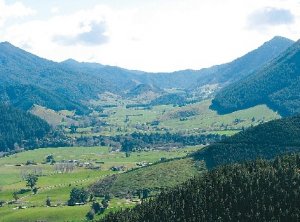I had this pleasant, but not really unexpected, experience recently after attending the launch of the Rai/Pelorus (top of the South Island) fact sheet: Realistic Solutions to Real Farm Problems.
It wasn't unexpected because when land and agri-business owners are equipped to solve their own problems, they generally do.
In 2000 the Rai Valley community was shocked to learn the effect farming was having on water quality.
Participants in the Marlborough Sounds based Outward Bound programmes were being affected by skin conditions when they swam and kayaked in local waterways. Council monitoring revealed E.coli bacteria exceeded contact bathing standards.
The farmers met, facilitated by the Rai Valley Rural Women New Zealand group and the NZ Landcare Trust, to find some solutions in a non-threatening and non-judgemental atmosphere.
It is often the women in a rural community who have the ability to draw people together from different sectors and interest groups to achieve a consensus and get something done.
Rural women have a breadth of knowledge and a wide perspective of both business and community needs and, given the opportunity, are adept at using these qualities to achieve change.
The Rai factsheet was described as unique by NZ Landcare Trust co-ordinator, Barbara Stuart, because it was designed and crafted by and for farmers. It offers realistic solutions to specific issues in the waterways concerned.
The four actions for the catchment are: keeping stock out of waterways; adequate effluent storage; low rate effluent application to land; attention to nutrient management. Implementing these are key to help farmers meet water quality goals and compliance regulations.
The locals in the Rai have already bridged many stream crossings and planted riparian strips with the help of Rural Women NZ members. They established a nursery at the area school supported by Department of Conservation, Marlborough District Council and Fish and Game NZ. This brought in direct contributions to environmental awareness and action to the children and young people of the district.
Now the "farmers as leaders" approach, supported by the Landcare Trust and the MAF Sustainable Farming Fund, has resulted in a user-friendly document which says that "the beneficial management practices shown in this factsheet take advantage of our expert knowledge of farming on this land, and were developed using a science 'on tap not on top' philosophy".
Could anyone argue with that?
There was no visible disagreement with the intent of the factsheet at the launch meeting. The representatives from central and local Government, Fish and Game NZ and Outward Bound, were all very positive.
So, what of the 5%?
At any meeting of farmers, there will always be a few grizzles, usually about costs.
This one was no different. A couple of speakers, while not criticising the project, wanted to have their say on the unshared cost burden of bridges and fencing, compliance and the ever depressing impact of regulations.
But, most agreed that progress is all about building partnerships and taking responsibility for any, albeit unintended, negative environmental practices.

















